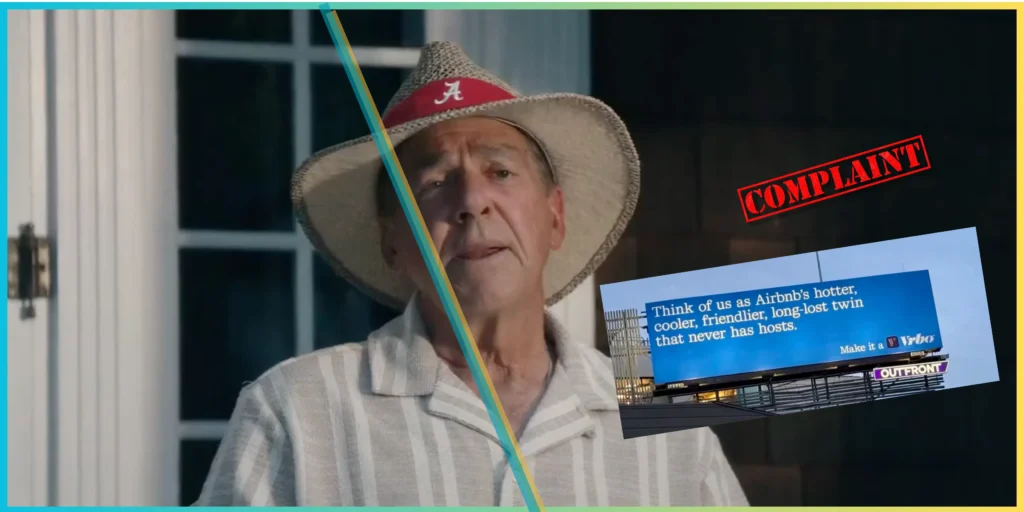Vrbo’s “host-free” campaign — from Nick Saban commercials to high-profile billboards — made waves for its cheeky positioning against Airbnb. The message? Vrbo offers whole-home rentals with no live-in hosts. The campaign’s most visible moment came when Vrbo placed a billboard directly across from Airbnb’s San Francisco headquarters reading: “Think of us as Airbnb’s hotter, cooler, friendlier, long-lost twin that never has hosts. Make it a Vrbo.”
Airbnb CEO Brian Chesky responded at the time with a laughing emoji on his Instagram Stories, seemingly dismissing the provocation. Publicly, Airbnb has continued to play down Vrbo’s marketing efforts. But behind the scenes, Airbnb took decisive action — filing a formal complaint with BBB National Programs’ National Advertising Division (NAD) to challenge several of Vrbo’s “host-free” claims.
Now, the results of that challenge are in. And they tell a much more serious story.
Airbnb Challenges Vrbo’s Host-Free Ads: Billboards Cleared, Commercial Must Change
In a Fast-Track SWIFT case (an expedited NAD process), Airbnb contested three specific Vrbo ads:
- The Nick Saban commercial
- The “never has hosts” billboard
- A billboard that read: “What do you call an Airbnb without a host? – Vrbo”
The NAD ruling broke down as follows:
✅ Billboard Claim Supported: Vrbo’s billboard stating it “never has hosts” was found truthful and accurate. Vrbo only offers entire-home stays with no on-site host cohabitation.
✅ Second Billboard Not Misleading: The “What do you call an Airbnb without a host?” billboard was allowed to stand — NAD found it didn’t imply Airbnb always involves host-sharing.
❌ Nick Saban Commercial Must Be Changed or Pulled: The ad implied that competitors like Airbnb always involve sharing a space with a host, which isn’t true. NAD recommended Vrbo discontinue or revise the ad to avoid misrepresentation. Vrbo agreed to comply.
Vrbo Can Keep Its ‘Host-Free’ Message — and Now Has Proof to Back It Up
While Vrbo lost one piece of its campaign, it gained something arguably more valuable: third-party validation. NAD’s ruling confirms that Vrbo’s core message — that its platform is always “host-free” — is factually accurate and legally defensible.
This matters for several reasons:
- It gives Vrbo legal and marketing cover to continue building a brand identity around privacy, whole homes, and hands-off stays.
- It sends a signal to travelers, homeowners, and investors that Vrbo can credibly differentiate itself from Airbnb on experience alone.
- It strengthens internal marketing operations: Vrbo can now confidently use “host-free” as a messaging pillar without internal legal hesitation.
- It may even help Vrbo defend its positioning against future competitors attempting to muddy the waters around “host-free” terminology.
In short, while Vrbo had to tweak one ad, it walked away with an industry-sanctioned stamp of credibility.
Airbnb’s Legal Pushback Reveals Vrbo’s Messaging Is Landing
Airbnb’s initial public reaction — a laughing emoji — suggested Vrbo’s campaign wasn’t worth serious attention. But their subsequent move to file a formal advertising complaint tells another story: Vrbo’s message was landing.
By pushing back via NAD, Airbnb signaled that it views Vrbo’s privacy-first narrative as a genuine reputational threat. The implication that Airbnb listings involve intrusive host interactions clearly hit a nerve — enough to justify legal review.
Whether or not Airbnb continues to dismiss Vrbo publicly, their actions show that they are taking this “host-free” positioning seriously.
How This Impacts Professional Short-Term Rental Managers
If you’re a professional short-term rental manager, this is more than a marketing story — it’s a strategic signal about where the guest experience is heading:
✅ Guest expectations are shifting: Travelers are being trained to expect full-property access, no host interactions, and seamless, professionalized stays.
✅ Privacy is a product differentiator: What was once a feature is now becoming a category expectation. Highlighting privacy and control in your listings — even outside Vrbo — could be a competitive advantage.
✅ Platform strategy matters: Vrbo is leaning into its identity as the “whole-home only” platform. If your portfolio fits that mold, this could be a moment to reassess channel mix and investment.
✅ Marketing cautionary tale: Comparative advertising works — but only when it’s fair and accurate. Vrbo got most of it right, but the Nick Saban ad crossed the line. Managers using ads or owner acquisition tactics that reference competitors should take note.
Airbnb vs. Vrbo Ads: A Branding Battle with Industry-Wide Implications
The latest Airbnb vs. Vrbo ads dispute shows how much is at stake in the OTA branding wars. Airbnb is fighting to maintain its broader appeal and fend off reputational challenges. Vrbo is working to entrench itself as the platform of choice for privacy, professionalism, and predictability.
And with this NAD ruling, Vrbo gets to keep saying what it’s built its campaign around: “host-free” is not just marketing. It’s truth.
For professional managers, that truth is a cue — not just to watch the ad war unfold, but to align your offerings and messaging with what guests now expect in 2025.
Uvika Wahi is the Editor at RSU by PriceLabs, where she leads news coverage and analysis for professional short-term rental managers. She writes on Airbnb, Booking.com, Vrbo, regulations, and industry trends, helping managers make informed business decisions. Uvika also presents at global industry events such as SCALE, VITUR, and Direct Booking Success Summit.








